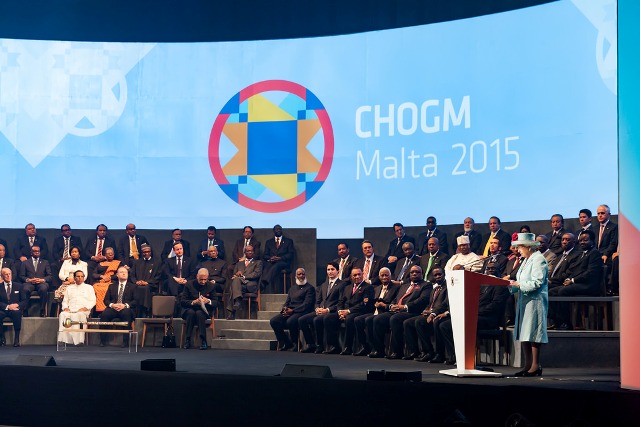 Many question the 'bizarre' line-up order for Commonwealth leaders at the Summit opening.
Many question the 'bizarre' line-up order for Commonwealth leaders at the Summit opening.
Drama
CHOGM’s Opening Ceremony, taking place on a squally, rainswept morning, was held in the splendid surroundings of the old hospital of the Knights of St John, now the Mediterranean Conference Centre.
As usual, the best speech came from the Queen. She was joined on the platform not only by the Duke of Edinburgh but also by the Prince of Wales and Camilla, and she made warm references both to her husband and to her son. In thanking Charles for his support for her role, she provided another pointer towards his possible succession to the Headship. Eight years before, at the 2007 Kampala CHOGM, eyebrows had been raised when Charles joined the round table meeting between Foreign Ministers and civil society representatives. But his handling of the job of representing the Queen in the difficult circumstances of the 2013 Colombo CHOGM was widely praised. And in Malta he was later to join the climate change dialogue with Commonwealth leaders, President Hollande of France, and Ban Ki-moon, the UN Secretary-General. He also spoke at the Business Forum. In future, his support for the Queen as Commonwealth Head can only increase – and with it his claim to be her natural successor.
Once again, Commonwealth leaders filed onto the stage in a most bizarre order. David Cameron, now in his sixth year as the UK’s Prime Minister, has at last made it out of the back row but still has a bevy of High Commissioners, officials and junior ministers around and in front of him. No such constraints applied to the new Prime Minister of Canada. Justin Trudeau, in office for barely a month, is now the Commonwealth’s poster boy and prodigal son, and had pride of place in the centre of the front row.
Amid the glamour, Joseph Muscat, Malta’s capable Prime Minister and CHOGM’s host, gently pointed that it was he who was the youngest leader present. He also urged the meeting to concentrate on the future, rather than the past, and argued that the organisation needed to change if it was to be part of the future. He wanted, he said: “A Commonwealth of aspiration, a Commonwealth of the future, a good Commonwealth.”
After lunch, as the summit got down to business, it was the turn of Commonwealth leaders collectively to take a crucial decision about the future: namely, who should be its sixth Commonwealth Secretary-General.
The Commonwealth likes to sustain the myth that its principal servant is selected by consensus, rather than by voting behind closed doors. To the extent that there are ballots cast these are, in the words of a former incumbent, Chief Emeka Anyaoku, “a straw poll to determine the nature of the consensus”.
Having provided administrative support to the conclave that selected New Zealander Don McKinnon at Durban in 1999, I take a more pragmatic view. If it looks, feels and smells like an election … then that’s what it probably is.
This would be especially so of Malta in 2015 because a simple binary choice was not available. At several stages, there were four declared candidates in the race. The last to enter was Bernard Membe, the former Foreign Minister of Tanzania, and the chairman of the association’s standards watchdog, the Commonwealth Ministerial Action Group. But no sooner had Membe’s entry suggested a divided African view than word came of his withdrawal – for reasons which were neither clear nor very convincing.
So, by the time leaders went into secret session, Masire-Mwamba (Botswana), Sanders (Antigua & Barbuda) and Scotland (Dominica) prepared to battle it out, albeit by proxy. Waiting in the wings in case of deadlock was the Australian High Commissioner in London, Alexander Downer, though he was to wait in vain.
On the first ballot, informed sources tell me, the big surprise was Sanders coming in third, with thirteen votes, and Scotland topping the poll. Using the exhaustive ballot beloved by British trade unionists, the voting now moved to a second round. The supporters of Sanders had to choose between the two remaining contenders and all voted again. Once again Scotland topped the poll, though by the narrow margin of 26-24. Crucially, three countries did not vote. The decision was then made unanimous – and consensus had been found.
Masire-Mwamba’s strong showing was unexpected, though some African leaders felt that the Secretariat had had a hand in Membe’s fleeting candidature. This prompted Botswana’s President, Ian Khama, to add a critical note to the closing session.
Sanders, too, felt aggrieved, considering that damaging article carried in the UK’s Daily Telegraph the day before had derailed his campaign. The British, of course, denied all prior knowledge of the piece; and, in truth, there were probably other factors which eroded support for Sanders
In the eyes of many, Scotland’s victory – the first woman to hold the post since it was instituted in 1965 – revealed her substance and her skill. Despite successfully shrugging off the label of “the British baroness”, she will need to demonstrate that she is in nobody’s pocket, least of all the UK’s. She will quickly need to build bridges with Commonwealth Africa. And perhaps she can also keep her two erstwhile opponents in the service of the Commonwealth.
In Malta, there was much talk of dusting off, and at last implementing, the recommendations of Amartya Sen’s 2007 report, Civil Paths to Peace. In that report, Sen argued that society needed to recognise and celebrate the multiple identities which many individuals possess, and build solutions accordingly. In selecting Patricia Scotland as the Commonwealth’s sixth SG, it seems that leaders have given substance to that concept in a very practical way.



